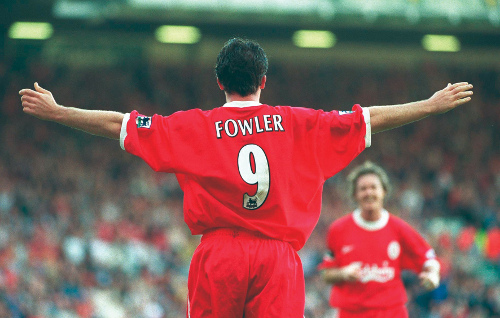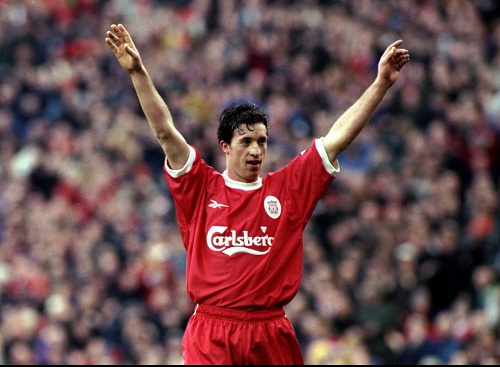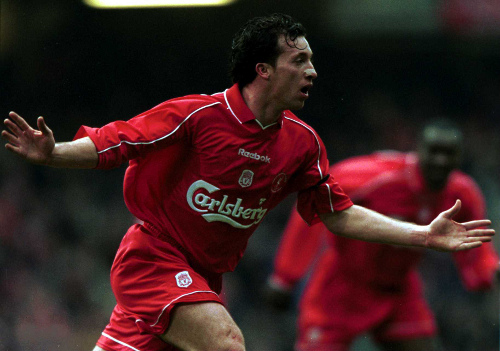Read extract from new Reds book
Liverpool FC Heroes is a unique portrait of what life is really like playing for one of the world's biggest football clubs.
Writer and female journalist Ragnhild Lund Ansnes has spent two years getting to know many of the greatest legends who played for the Reds during the past 50 years.
The result is a ground-breaking official club book which, for the first time, delves beneath the surface to tell the human story of the man behind the player. Never before have so many Anfield heroes opened up so freely about their personal lives in a book.
And in this extract, Ragnhild talks to the man the Kop christened 'God'. Robbie Fowler.

25 May 2005. Ponder that date for a second.
It gives most of us Reds good vibrations. The atmosphere that evening and through the night was electric in the heat in Istanbul, where Manchester City's Robbie Fowler celebrated the outcome of a thrilling match at the Atatürk Olimpiyat Stadyumu.
The Miracle Final, when mission impossible was accomplished: To catch up with AC Milan's three goal advantage in six unbelievable minutes of the second half. The sweet smell of victory spread across the world.
It was concentrated in Liverpool and similarly intense in countries like Ireland and Norway. And the jubilations had spread to a house on the island of Tobago, where Jostein and I had just arrived, celebrating the fifth win of the grand trophy, that was now Liverpool Football Club's to keep.
We had champagne, and emotions soared high in the weeks and summer months to follow. Liverpool fans all over the globe smiled their way into the summer of 2005. It had an effect. A fruitful one.
The following spring, I was in a delivery room in Trondheim having my firstborn.
And I was not alone in feeling what powers a woman's body holds. On Merseyside, there was a baby boom. May 9, 2006, two women in labour in adjoining rooms: in one room Alex, due with her second child; next door, Kerrie, giving birth to her fourth.
In and out of the rooms, two expectant fathers. From time to time they would debrief in the corridor, eyeball to eyeball. Who would have theirs first?
It is good to have a team-mate and friend in the corridor on such a special day; the birth of a child is a powerful and strong experience.
Imagine then, two team-mates and two of Liverpool FC's biggest stars of all time, having an offspring on the exact same day!
Steven Gerrard and Alex Curran have their little girl Lexie only about an hour before Robbie Fowler and his wife Kerrie welcome Jacob, the first boy in a family of three daughters, into the world.
In the corridor, the two newly-fledged fathers celebrate yet another miracle in the aftermath of that other miracle.
The Fowler household is at full blast with four children; Madison, 12, Jaya, 11, Mackenzie, nine, and Jacob, the youngest, who turns six in May.
Robbie had not made the connection between the birth of our children and the miracle final until I had highlighted it along with the rest of the baby boom on Merseyside.
"You know, I hadn’t thought of that - but you could be right!" he laughs.
I had tried to get hold of the man for a long time. He had lived and played in Australia, taken coaching certificates in Ireland and - all of a sudden, he was player-manager in the Thai Premier League.
Nobody knows where he'll go next.
But we know there will be a ball near him. Robbie Fowler - the rebel, God, the natural finisher, the local lad. Suits, fast cars and property king.

When he reported in at the very end of my project, it was quite sudden. I spun around quickly, one year's hunt had landed me an exclusive interview. I was a little anxious.
My questions and my project could not have met with a more grounded, attentive and friendly fellow. He had seemed so elevated and inaccessible - but turned out to be the most easy-going, down-to-earth bloke you can imagine.
He had just taken his kids to school. The family was back on Merseyside. His eldest daughter will soon be a teenager, but he still thinks about how he can stretch his playing career a little longer.
Ever since he was a boy, playing football was all he wanted to do. He grew up in Toxteth, a neighbourhood in walking distance from Liverpool city centre. The area became well known during the riots of July 1981.
Robbie was only six when the worst riots ravaged his neighbourhood.
He grew up in a catholic home with his mother Marie, older sister Lisa and brothers Anthony and Scott, while his father Robert lived nearby. And the only thing Robbie would think of was football. He played all the time.
He was not in an organised team back then, but across the road from them, lay a park where he played every day after school; either with his mates or just with dad, Robert.
They discovered early on that Robbie was a natural, but to begin with only his left foot obeyed. So the young football talent would go out in the park five to six times a week with his dad to train his right foot.
Untiringly he would shoot balls against the fence. He wanted nothing more than to become a professional. But as he says: "You don't just wake up and think you'll be a professional player. Even though I was a gifted player, I had to work hard for my dream."
But motivation was easy, football is a dominant cultural phenomenon in his hometown. Football is wrapped around you.
"There's not much else going on in Liverpool but football. You've got the two football teams dominating the city, and families are divided between them. My family went to the Everton games and I grew up with an interest in football.
"I wasn't forced into football, I loved playing. Football is a way of life in Liverpool. It's all around you, the papers are full of it, you just can't escape it."
He did not play organised football as early as talents do today. He developed through play and individual training.
"I played football everywhere. I always had a ball with me. If I wasn't playing, I was carrying it around. Kids today have all kinds of computers, iPhones, laptops, iPods, iPads. All I had was a football."
He went to the catholic school of St. Patrick. He played a lot of football with his mates. In school, the teachers were responsible for suggesting new pupils for trials with Liverpool Schoolboys and eventually Robbie's name was on the list.

So he got to try out for U11 Liverpool Schoolboys in Penny Lane, made famous by a certain song.
It wasn't just football and homework that kept little Robbie Fowler occupied in school.
"I don't think anybody knows this, but when I was in junior school, I was an altar boy in the school's church."
At lunchtime, Robbie would be getting the bread and wine ready for Holy Communion, and later he would walk up the aisle with the priest during the service. I took a deep breath, this was an unknown side to Robbie Fowler’s childhood. It made me smile.
The biggest profiles and greatest stars of football earn nicknames.
There have been a lot of them: The Anfield Iron, Barney Rubble, Crazy Horse, King Kenny, Super Sub, Ginger, Digger, Pinocchio, Mighty Mouse, Captain Fantastic, The Colossus, Quasimodo, The Gentleman, Stan the Man, Razor, to name but a few.
And it was the latter, Razor – or Neil Ruddock – who first came up with the nickname for the boy who had been given a chance by Graeme Souness to play for Liverpool FC’s first-team already at 17.
A boy who scored goals from any distance and every angle.
A guy so unbelievably sharp inside the box, a Toxteth lad who, by one and all the ex-players I have talked to, has been dubbed the most natural finisher Liverpool FC has ever had.
Ruddock's nickname spread quickly among the fans and the press, and since then, Fowler has been called God. No less.
That really made me smile – with Robbie's little secret from his childhood, I could not help chuckling. "The altar boy turned God." Talk about making the grade!
"All footballers want a nickname. Mine was unbelievable. You can't get any better, in my eyes." He grins.
"You certainly can't get any higher," I throw in, and we both smile while he reassures me he does not go around calling himself God.
Then adds: "When I came into the team, I could do nothing wrong and everything I touched seemed to benefit me or the team. Then Ray (Neil Ruddock) started calling me God.
"He still does. That's an unbelievable nickname. I've been called a lot of things in my past, but this is without doubt by far the best of them!"
Fowler has certainly been called a number of things both on and off the pitch.
You do not score one of the fastest ever hat-tricks, grow up as an Evertonian but choose Liverpool FC, and operate with great confidence both on the field and in the city with the nickname God, without getting a bit of stick from other teams' supporters.

Let us return to where it started: In Penny Lane, trying out for Liverpool Schoolboys. Robbie got picked and started playing for the U11s. They trained every Tuesday and Thursday and played matches on Saturdays.
"Being selected for Liverpool Schoolboys, you're deemed among the best of your age group, so there are always talent scouts there – from the top, as well as the lower league clubs."
He was discovered by Liverpool's Jim Aspinall, who came to the Schoolboys' training sessions several times to look at Fowler.
The man who drove Steve McManaman to Kenny Dalglish in his car, and made sure the super talent with the wavy hair signed for Liverpool, managed to sign yet another Evertonian, yet another talent that would write his name in Liverpool FC's history books forever.
"Whoever you support, if someone like Liverpool or Everton wants you to sign for them, you listen, whether you like the team or not. When you're given a chance to play and train with them twice a week, you know you'll develop as a player.
"Many of the Evertonians who became Liverpool players say Liverpool FC had a better youth team and talent development than Everton. Do you agree?"
"I don't know, I was always at Liverpool. But I grew up an Everton supporter, no doubt about that. But as much as I was an Evertonian, I stayed at Liverpool FC because I appreciated the club and who they were and what they were about.
"I went up there and had a great time playing for Malcolm Cook and later Stevie Heighway, who took over.
"Steve was fantastic and could be very demanding. The Liverpool legend knew how to get the most out of us and did an incredible job with people like Jamie Carragher, Michael Owen and David Thompson.
"He appreciated good players who worked hard; he talked to us every day and made sure we did the right things. I've always got time for Stevie."
Fowler had fun and developed well at Liverpool's Centre of Excellence. When he was offered a place in the team in his heart, he did not see the point in changing, even as an Everton supporter.
It was a Tuesday night with icy winds and rain, the kind of rain that beats against your body and, combined with the merciless winter winds, makes life insufferable for whoever ventures outdoors.
Robbie had just finished the day's training at Liverpool's Centre of Excellence and was now waiting with his father at the bus stop, freezing, teeth chattering.
Robbie's family could never afford a car. Soaking wet, they watched Kenny Dalglish's white Mercedes approach them in the rain. The car slowed down and stopped. Kenny rolled down the window and asked if he could take them home.
"What a manager to do such a thing. And he wasn't just a manager, but the manager of probably one of the most successful clubs in the world. He didn't have to stop, but he wanted to.

"It told me everything; well it confirmed what I already knew, about the kind of man Kenny is. A fantastic player, a fantastic manager and that night he showed me what a magnificent person he is, too."
It was not to be the last time Dalglish gave Fowler a lift as a young lad.
Fowler played altogether 11 seasons over two spells for Liverpool Football Club. His strongest memory from his long service at the club is a friendship that is as strong today as it was then.
"The first time I met Stevie Mac, I was with U11 Liverpool Schoolboys, and Stevie, who is three years older than me, played for U14. They trained at the same times as us. I always appreciated good players, and even though he was quite small then, he stood out."
Fowler and McManaman ended up going to the same tournament in Holland and that’s where they got to know each other.
"We were fairly similar in size and stature. He was tiny as a kid and ended up playing for Liverpool FC. As he was older, he probably looked down on me, being this little kid."
"And you looked up to him?"
"Oh yeah, of course! He represented hope and possibilities. When I came to Liverpool FC, we became great, great mates. Even though he doesn't play anymore, and I still try to play, we speak to each other 5-6 times a week."
McManaman now works as a football pundit, but Fowler feels he still has more to give as a player.
He had recently resigned as player manager for the Thai club Muangthong United, but felt the league level was far higher where he had just come from – Australia, where he had spent two years playing for North Queensland Rovers and Perth Glory.
But despite vast distances and time differences the last few years, Macca and Robbie have stayed close friends. McManaman also speaks warmly about his friend.
"He's just a local, working class lad with similar values to myself. We laugh at the same things, joke about the same stuff, have the same mates and good banter. We're a bunch of lads who've been friends since forever.
"One of us just has to pick up the phone, and they’ll all come running. Life is about not forgetting where you’re from. Not losing yourself or who you are. That’s Robbie, he can do that. He’s my best mate."

"McManaman speaks very warmly about you. How would you describe your friendship?"
"Our families are very close and we spend a lot of time together, and Stevie Mac and I have owned horses together, we hang out and he's a great mate. We've played football together, yes, but we have stayed friends and treated each other the same way regardless.
"We give each other stick, we compliment each other. That's probably why we’re such good mates. We can be ourselves, we’re not false."
"Can you trust people, being a famous person with a high profile?"
He laughs, breaths out, then pauses: "Difficult question, really. I'm probably one of most trustworthy people. Even if you want to be honest at all times, you can't always be. Because you're a footballer, quite a few hang on your coat-tails.
"I guess I've always been wary and I think I'm quite a good judge of character."
"Have you ever experienced somebody breaking your trust? Someone who turned out not to be what you thought?"
"No, because I haven't let people get too close. I've got friends outside football but they were friends from before I started playing. And I've got quite a few friends through football. But I haven't given anyone a chance to turn me down.
"I'm happy with the friends I've got."



